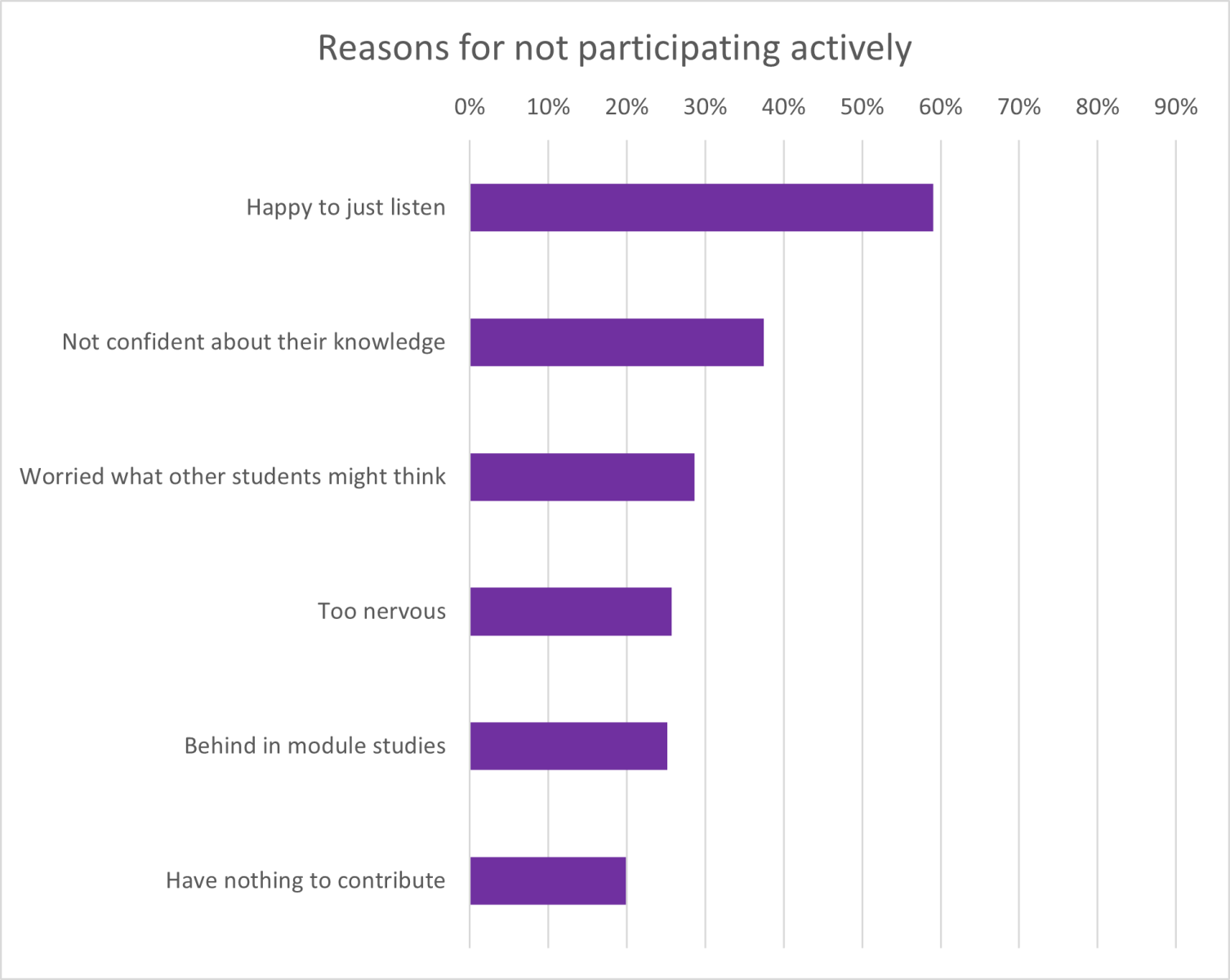Online tutorials and active participation – what do students think?

By Kevin Amor and Allan Mooney
The Open University (OU) recently sponsored a pan-university survey, Synchronous Online Learning: Addressing the Challenges of Student Engagement, to gauge students’ thoughts on active participation in online tutorials. It found that a significant proportion of students, despite acknowledging the benefits, have concerns with the idea of active learning.
OU content is delivered predominantly online, asynchronously. Online tutorials are an exception to this, giving students an opportunity to partake in synchronous learning with direct engagement with tutors.
It has become somewhat of a given in higher education, especially for online delivery, that active learning, involving collaborative activities, for example, leads to better learning outcomes (e.g. Lear et al., 2010; Caliskan et al., 2020). However, it is worth noting that resistance to active participation has been detected before (e.g Vivolo, 2016). The OU’s survey sought to establish the extent to which students find active participation in online tutorials desirable or beneficial.
In the complete study 620 students and 197 tutors answered a range of questions about online tutorials. This article will focus on just a few of the questions posed and their student responses.
The survey tells us that 59% of students agreed with the statement ‘I enjoy online tutorials where I can actively take part’. This is a promising start; there are links between enjoying learning and successful motivation, interest, and engagement (see for example, Okada & Sheehy, 2020). Indeed, when we move from ‘enjoy’ to recognising ‘benefit’ 66% of students agree with the statement ‘I think there is a benefit to me if I actively take part in online tutorials’. However…
When asked to comment on the statement ‘I feel stressed in online tutorials when I am expected to actively take part’ 33% of students agreed. This is a sizeable proportion of students. Indeed, this may be driving an observed trend whereby students prefer to watch recordings of online tutorials than partake synchronously. For example, on a recent Faculty of Business and Law (FBL) module with over 1,800 registered students, analysis shows that recordings of tutorials were watched by 51% more students than attended synchronously. In an associated question, the statement ‘I feel confident speaking in online tutorials’ attracted only 35% agreement. These findings suggests that online tutors need to be aware of the stress that participation may cause. Accordingly imposing participation may cause a negative association with online tutorials. This is particularly challenging in an online environment, where tutors may be deprived of the visual cues showing discomfort that might be more obvious in a face-to-face setting. We also need to ask whether the style of online tutorial has an impact.
49% of students agreed with the statement ‘In online tutorials the tutor's role is to teach facts’. However, this rises to 69% for FBL students. In a similar vein the statement ‘Thinking and reasoning processes are more important than specific module content’ only 34% of students agreed. Just under half, 48%, of students preferred online tutorials where the tutor does the talking. Only 31% of students agreed with the statement ‘Students learn best by finding solutions to questions and problems on their own’. This suggests students, and especially business and law students, prefer to be given information and methods in the traditional manner, rather than being taught learning processes or encouraged to learn by discovery.
We can bring these last two findings together and ask why students have not participated actively in the past. The top responses are given in this chart:

The top reason given was that students simply did not wish to partake actively, ‘I was happy to just listen’. This lends some support for traditional ways of teaching with the expert transferring knowledge to the student. Also, students express a lack of confidence in their knowledge. Other reasons include being worried about what other students might think. This is presumably the perennial fear of asking a ‘stupid’ question. There is also the problem that the student had not yet arrived at the appropriate part of the module. Clearly a lack of confidence is behind a few of these responses. If module teams are going to encourage active participation, then they need to build-in confidence building activities as part of the design.
Conclusions
It has become a modern-day mantra that learning is most effective when it involves learning through active participation, by for example collaborating in authentic activities. Indeed, the survey shows that over half of students enjoy such activities and recognise their benefits. However not all students feel comfortable actively participating and this is not their preferred approach to learning.
A third of students find the expectation of active participation stressful and just over a third reported feeling confident speaking in online tutorials. 69% of FBL students thought that tutors should provide facts in online tutorials rather than teaching how to think and learn. Less than a third of students thought that the best way to learn was through personal discovery.
All of this suggests that current academic approaches to learning in respect of active participation in online tutorials are not aligned to all students’ comfort zones or beliefs in how they should be taught. Such misalignment may cause friction between tutors and students and lead to disengagement and demotivation from significant cohorts of the student community.
Our call to action
Our challenge for Module Teams is to experiment with module tutorials and try the following things to enable a choice of active or non-active participation by:
-
In tutorials allow students to flag that they do not wish to be approached to participate (asked a question or invited to provide a view). This could be by way of adding an extra symbol (for example, the Adobe Connect platform that the OU commonly uses has a ‘disagree’ symbol) such as 'Do Not Disturb'.
- Offer two styles of tutorial for each event – one participative and one not. This would allow a closer match between student-learning and tutor-teaching preferences.
- When deciding on a breakout activity ensure choice. Room 1 – work alone and have whiteboard activity optional, Room 2 – discussion and interaction with fellow students, Room 3 – reflection with no pressure to interact. Perhaps use a poll to manage this process.
References
- Caliskan, S., Kurbanov, R. A., Platonova, R. I., Ishmuradova, A. M., Vasbieva, D. G., & Merenkova, I. V. (2020). Lecturers Views of Online Instructors about Distance Education and Adobe Connect. International Journal of Emerging Technologies in Learning (iJET), 15(23), 145–157. https://doi.org/10.3991/ijet.v15i23.18807
- Lear, Janet L., Charles Ansorge, and Allan Steckelberg. "Interactivity/community process model for the online education environment." Journal of online learning and teaching 6.1 (2010): 71-77.
- Okada, A., & Sheehy, K. (2020). Factors and Recommendations to Support Students’ Enjoyment of Online Learning With Fun: A Mixed Method Study During COVID-19. Frontiers in Education, 5(December). https://doi.org/10.3389/feduc.2020.584351
- Vivolo, J. (2016) Understanding and Combating Resistance to Online Learning. Science Progress, 99(4), pp. 399-412. https://doi.org/10.3184/003685016X14773090197742

Kevin Amor
Kevin Amor is a Chartered Accountant and a lecturer in the Department of Accounting and Finance at The Open University. He has spent most of his career in real estate investment, ending up as director of various investment funds. He has also been a tutor on both the MBA and MSC Finance since 2008 and an OU student for over 20 years. Kevin is currently the qualification lead on the Business School’s new degree, BSc Accounting & Finance.

Allan Mooney
Allan is a lecturer and Student Experience Manager at The Open University. He completed his MBA and MSC in HRM at Glasgow Caledonian University. He was previously Head of Learning and Development within Forestry and Land Scotland, an agency of the Scottish Government. Prior to that, he was a CIPD lecturer at City of Glasgow College and Chair of the CIPD Organisational Development Group. He is currently a Chartered Fellow of the CIPD and Senior Fellow of the Higher Education Academy.

Blog posts
- A journey into the unknown: Valuing marginalised voices: a co-creation approach to improving student experience 17th March 2025
- Educating Prisoners: The Importance of Relationships 3rd March 2025
- Championing success at The Open University (OU): How the Faculty of Business and Law (FBL) Module Champions are harnessing Artificial Intelligence (AI) to support tutors and students 27th January 2025
